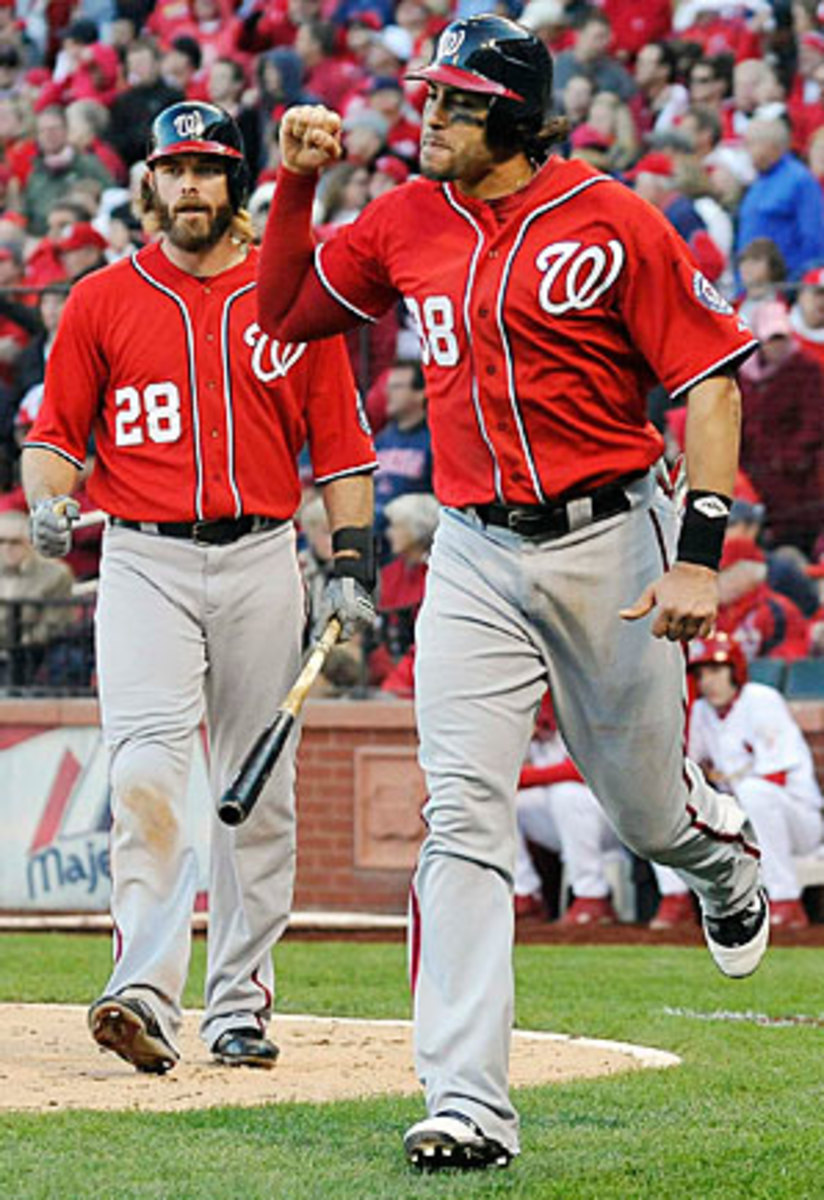Johnson's rare move pays off in Nationals' Game 1 NLDS win
ST. LOUIS -- It's early yet, but this postseason's competition in the art of metaphor-making might already be over. "It's not my first rodeo, and, you know, I'm kind of a dinosaur, and I don't change my stripes," said Davey Johnson, the Nationals' 69-year-old manager, when asked early on Sunday to describe his approach to this year's playoffs. That's back-to-back-to-back, for the English majors scoring at home.
Then, in the top of the eighth inning of Game 1 of this NLDS, with his club trailing the Cardinals by the score of 2-1, Johnson did something that must have been unexpected even to him: he changed. Johnson has never been enamored with small ball, as he admitted after the Nationals had eked out a 3-2 win to take a 1-0 lead in the best-of-five series. "I don't like to bunt," he said. "I'm kind of from the Earl Weaver school: just keep swinging. Don't like to steal that much, either. I don't like to give up outs."
Johnson's team produced just 50 sacrifice hits this season, the second-fewest in the National League. With men on first and third with no outs, though, Johnson transmitted a rarely used sign to batter Danny Espinosa. He commanded his second baseman to bunt. With the slow-footed Michael Morse on third, it was not a safety squeeze, either, though Johnson said that he'd considered putting the speedy pitcher Edwin Jackson on third as a pinch-runner to set up that possibility, but then decided better of it to protect his Game 3 starter's health. All Johnson wanted to do was advance the runner on first, Ian Desmond, into scoring position, even if it meant sacrificing an out.
Espinosa did as he was told, and did it ably. Still, it was a curious move, even for a manager without Johnson's particular well-honed philosophy. Espinosa had looked overmatched in striking out in his first three at-bats, but even so, he is a player who hit 17 home runs this season, and 37 doubles. But Johnson bet that Espinosa's chances of doing anything but striking out again or hitting into a double play exceeded those that he'd be able to capably lay one down, and then that the Nationals would be able to tie the game with one fewer out to play with. It was a gamble that offended traditionalists and the staterati alike, sending them off on a race to express their derision in 140-character bursts.
The decision seemed likely to backfire after the following batter, Kurt Suzuki, struck out against reliever Mitchell Boggs. Then Cardinals manager Mike Matheny brought in the lefty specialist Marc Rzepczynski -- "Pierzynski, or whatever his name is," Johnson would say -- to face the Nationals' lefthanded hitting pinch-hitter Chad Tracy, and then Johnson countered by pinch-hitting with the righthanded Tyler Moore. Moore lashed Rzepczynski's fifth pitch to right field, and the Nationals had a 3-2 lead, and then a 1-0 advantage in the series, with just one more game to be played in St. Louis.
"I didn't know if the bunt was put on, or if Danny did it himself or whatever," third baseman Ryan Zimmerman would say. "I think all of us would want to hit. But for Davey to put Danny on, and for Danny to execute that perfectly, you've got to give him credit. And it worked, and that's kind of how we won.
"Davey's obviously pulled a lot of strings this year that've worked, and that's why we are where we are," Zimmerman continued. "Davey's been through a lot of this stuff before, so he definitely has the best idea of anyone in here."
Not all of Johnson's hunches paid off, at least immediately. He conceded that he had left reliever Craig Stammen in to face one batter too many in the bottom of the seventh, as Stammen hit Matt Holliday with a pitch to load the bases with no outs. ("He's my lucky horseshoe pitcher," Johnson would say of Stammen, by way of explanation). But even that one did no harm, as Ryan Mattheus induced a fielder's choice at home, and then a double play, allowing the Nationals to escape with a one-run deficit, and setting up Moore's heroics.
You can, of course, approach the playoffs by playing by the book, but a franchise that hires a 69-year-old man who got his first job as a big league manager 28 years ago does not necessarily want him to do it that way. It wants him to do whatever he thinks is necessary to win. This was an afternoon on which Johnson's No. 1 starter, Gio Gonzalez, did not have the command that made him an NL Cy Young contender -- Gonzalez walked seven hitters in his five innings, though, to his credit, he allowed just one hit and two runs ("Obviously, my stuff wasn't there, but a great pitcher keeps his team in the game, and that's what I tried to do," Gonzalez would say). It was an afternoon on which, for its majority anyway, the Johnson's clutch batters were not as such (Jayson Werth left seven men on base by himself, twice failing to come through with two outs and the bases loaded).
It was also an afternoon on which Davey Johnson relied on his accumulated experience to do what virtually no one else in baseball would have done, and to contradict what he himself had promised just hours before. And that, as much as anything else, was why Washington D.C. got its first postseason win since 1933.






